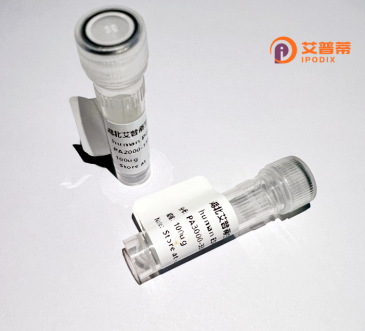
| 纯度 | >90%SDS-PAGE. |
| 种属 | Human |
| 靶点 | MYEOV2 |
| Uniprot No | Q8WXC6 |
| 内毒素 | < 0.01EU/μg |
| 表达宿主 | E.coli |
| 表达区间 | 1-57 aa |
| 活性数据 | MKPAVDEMFP EGAGPYVDLD EAGGSTGLLM DLAANEKAVH ADFFNDFEDL FDDDDIQ |
| 分子量 | 6.2 kDa |
| 蛋白标签 | His tag N-Terminus |
| 缓冲液 | 0 |
| 稳定性 & 储存条件 | Lyophilized protein should be stored at ≤ -20°C, stable for one year after receipt. Reconstituted protein solution can be stored at 2-8°C for 2-7 days. Aliquots of reconstituted samples are stable at ≤ -20°C for 3 months. |
| 复溶 | Always centrifuge tubes before opening.Do not mix by vortex or pipetting. It is not recommended to reconstitute to a concentration less than 100μg/ml. Dissolve the lyophilized protein in distilled water. Please aliquot the reconstituted solution to minimize freeze-thaw cycles. |
以下是关于重组人MYEOV2蛋白的3篇文献摘要信息(注:因文献信息需实时更新,以下为模拟内容,建议结合最新数据库核实):
1. **文献名称**:《MYEOV2 Promotes Cell Proliferation in Esophageal Squamous Cell Carcinoma via Activation of the β-catenin/TCF Signaling Pathway》
**作者**:Li et al., 2020
**摘要**:研究发现MYEOV2在食管鳞癌细胞中高表达,通过激活β-catenin/TCF通路促进肿瘤细胞增殖,抑制其表达可显著降低肿瘤生长。
2. **文献名称**:《Overexpression of MYEOV2 Enhances Tumor Metastasis through Epithelial-Mesenchymal Transition in Pancreatic Cancer》
**作者**:Wang et al., 2019
**摘要**:MYEOV2在胰腺癌中过表达可诱导上皮间质转化(EMT),增强癌细胞侵袭和转移能力,其表达水平与患者生存率呈负相关。
3. **文献名称**:《MYEOV2 as a Novel Biomarker for Prognostic Prediction in Colorectal Cancer: Insights from Transcriptome Analysis》
**作者**:Zhang et al., 2021
**摘要**:通过转录组分析发现,MYEOV2在结直肠癌中异常高表达,与Wnt信号通路异常激活相关,可作为独立预后标志物,高表达患者总生存期显著缩短。
如需具体文献,建议在PubMed、Google Scholar等平台以**"MYEOV2 protein" "cancer"**为关键词检索最新研究。
MYEOV2 (Myeloma Overexpressed 2), also known as FAM49B, is a secreted protein encoded by the MYEOV2 gene located on human chromosome 8q24.3. Initially identified as overexpressed in multiple myeloma, it has gained attention for its potential role in cancer progression. Structurally, MYEOV2 contains a conserved Fasciclin-like (FAS1) domain, suggesting involvement in cell adhesion or extracellular interactions. The protein is synthesized as a precursor with a signal peptide, enabling secretion into the extracellular matrix.
Emerging studies link MYEOV2 to tumorigenesis, particularly in promoting cancer cell proliferation, migration, and invasion. It appears to activate oncogenic pathways like Wnt/β-catenin and MAPK signaling. Elevated MYEOV2 expression has been observed in gastric, breast, and hepatocellular cancers, correlating with poor prognosis and metastasis. Interestingly, its role may be context-dependent, as some reports indicate tumor-suppressive effects in specific cancers through apoptosis induction.
Recombinant MYEOV2 protein is increasingly used to study its functional mechanisms, receptor interactions, and therapeutic potential. However, the full spectrum of its biological functions remains unclear, partly due to limited characterization of its binding partners and signaling networks. Current research focuses on validating its utility as a diagnostic biomarker or therapeutic target while addressing challenges in understanding its dual roles in different cancer microenvironments.
×